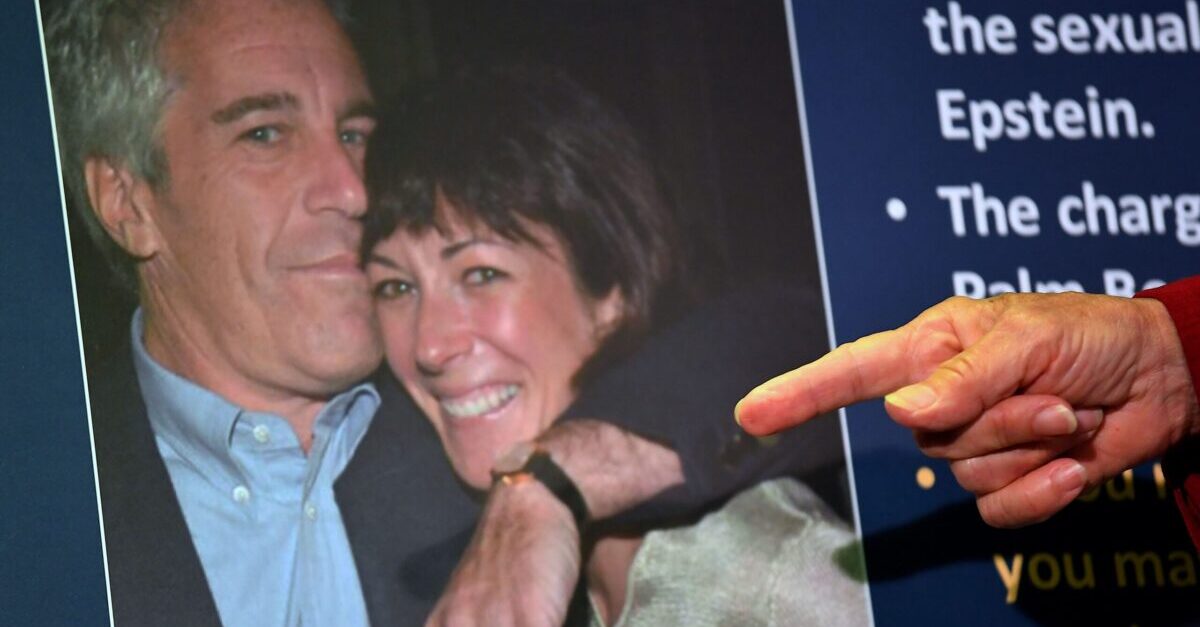
With jury selection slated to start later this week, a federal judge agreed to let prosecutors call alleged sex trafficker Ghislaine Maxwell’s accusers “victims” and allow certain witnesses to testify under pseudonyms. Maxwell’s lawyers argued that the use of witness pseudonyms would be “unnecessary, unworkable and unconstitutional,” but the judge found it an appropriate precaution to protect alleged victims from harassment.
“The government proposes various false or partial names for some of the accusers and witnesses,” Maxwell’s attorney Jeffrey Pagliuca wrote in a memo. “The request is not supported by any factual declaration. No evidence exists suggesting that any witness has been or would be threatened by Ms. Maxwell. None of the witnesses are minors.”
More than 10 fully redacted pages of the 69-page document follow that statement.
In ruling in the government’s favor, U.S. District Judge Alison Nathan called it “unnecessary” and “impractical” to prevent prosecutors from using the word “victim.” This ruling reached the opposite conclusion as a separate high-profile criminal case in the United States: that of Kenosha shooter Kyle Rittenhouse, whose judge recently barred prosecutors from using that word in a state court in Wisconsin. The comparison was not made during Monday’s proceedings.
As for witness anonymity, Judge Nathan cited recent precedent in the case against NXIVM founder Keith Raniere as another high-profile case involving allegations of sexual abuse, where alleged victims testified under pseudonyms.
Judge Nathan called such measures necessary to protect witnesses from harassment by the press and public. She also rejected Maxwell’s request to make any arguments related to the controversial non-prosecution agreement purportedly protecting Jeffrey Epstein’s alleged co-conspirators from prosecution. The judge previously ruled that the agreement did not shield Maxwell.
Maxwell’s attorneys wanted to tell the jury that prosecutors targeted their client out of embarrassment over the 2008 plea deal, which led to a cascade of media coverage denouncing the government’s light treatment of the convicted sex offender.
“The court finds that this specific proffered evidence is irrelevant to the charged conduct and is therefore inadmissible,” Judge Nathan said.
Rejecting the defense effort to allude to pressure on the government over the Miami Herald’s groundbreaking coverage of the case and then-Attorney General Bill Barr’s statements about it, Judge Nathan noted: “For purposes of the jury, ‘the government is not on trial.'”
Jury selection is scheduled to begin on Thursday for Maxwell’s trial, starting with a recently disclosed questionnaire that will question candidates on their familiarity with the case and their experience with matters involving sexual trauma.
Maxwell’s most recent indictment accuses her of grooming and trafficking at least four girls for Epstein’s predation from 1994 to 2004. Their identities have been anonymized in court papers as “Minor Victim,” with the exception of one publicly identified as Annie Farmer (a.k.a. “Minor Victim 2”).
One of the two siblings described by the New York Times as “The Sisters Who First Tried to Take Down Jeffrey Epstein,” Farmer was 16 years old when she said Maxwell gave her a topless massage in Epstein’s ranch in New Mexico in 1996.
As for the woman identified as “Minor Victim-3,” Maxwell’s lawyers say that this was a misnomer. At the time of the alleged conduct, the woman was 17 years old and attained the age of consent. Judge Nathan appeared to agree with this argument, telling prosecutors that whatever one feels about the “immorality or wrongness” of the alleged conduct surrounding this witness, those actions did not appear to be legally relevant to the Mann Act allegations.
From an initial pool of 600 juror candidates, Judge Nathan will question the remaining candidates during a voir dire scheduled between Nov. 16 and 19. All of the candidates will be anonymous and identified by numbers, but their answers will otherwise be made public. Maxwell’s trial will then be scheduled to begin on Nov. 29.
The top charges on her latest indictment are sex trafficking conspiracy and sex trafficking of a minor. She also faces two charges of conspiring to entice minors to travel to engage in illegal sex acts, a count of conspiring to transport minors to engage in criminal sexual activity, and transportation of a minor to engage in criminal sexual activity.
Maxwell faces up to 80 years in prison if convicted of all charges against her.
She will be tried separately for allegedly perjuring herself during depositions for a civil lawsuit filed by Virginia Giuffre, one of Epstein’s most vocal victims who also has sued Prince Andrew and Alan Dershowitz for alleged sexual misconduct. Both men vehemently deny the allegations, and the prince has a hearing in the same courthouse on Wednesday, to argue that Giuffre’s lawsuit should be dismissed. Dershowitz countersued Giuffre for defamation.
After more than three hours and 30 minutes of arguments and pre-trial rulings, proceedings ended with Maxwell’s attorneys complaining about the conditions of their client’s detention before trial. Maxwell claims that she has been woken up at all hours behind bars, preventing her from adequately preparing her defense.
“She is given very little food and whatever she is given doesn’t even have a utensil for her to use. And, she is shackled,” Maxwell’s lawyer Bobbi Sternheim said in court. “Today she had to get on her hands and knees to climb into the van because her leg shackles would not permit her to step up. This is just not the right thing.”
She has raised similar arguments before in unsuccessful attempts to persuade Judge Nathan to grant her bail.
Read Maxwell’s opposition to witness pseudonyms, below:
[image via JOHANNES EISELE/AFP via Getty Images]